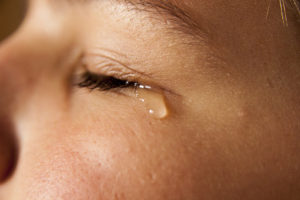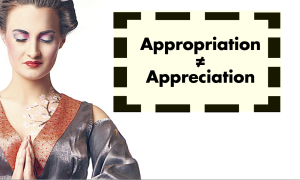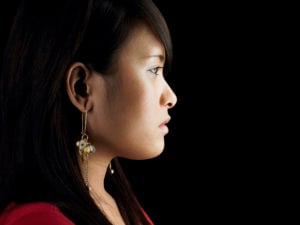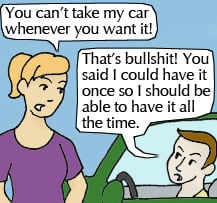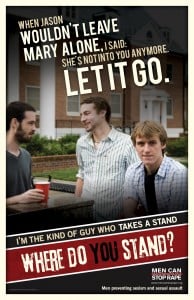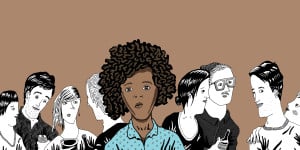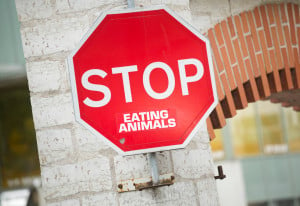Eight years ago, I got called out.
And to be honest, it wasn’t a personal attack that looks like what we now label a “call out.” It was someone, rightly, expressing frustration over a ridiculous comment I made that ignored the contributions of Black folks.
At the time, it shocked me so much that it made me pay attention. It was a wake up call.
And I vowed to never let politeness get in the way of doing important work.
But then, six months ago, I really got called out.
And by “called out,” I mean that the person had more interest in collecting me like I was garbage in a very public way and less interest in helping me understand where I was going wrong.
Despite my willingness to apologize, to try and learn, their attitude pulled me back into that whirlwind of cognitive ability confusion. As a person on the autistic spectrum, I can’t count the amount of times I’ve been unsure of what I’ve done wrong and have tried to figure out what I did.
And when you’re an articulate person with cognitive dysfunctions, no one believes you struggle in this way, which compounds the problem. There is shame attached to admitting you can’t understand and a degree of fear that others will insist you can – you’re just being difficult.
It’s complicated when you know you’ve cried white tears in the past, when you have so much self hate that you can and do use social justice as another way to tell yourself you’re crap.
It’s complicated when you aren’t sure if demanding basic respect for yourself is the right thing for your self-care or just another attempt to center the discussion on you.
I still get confused. I won’t lie.
But here are some things I’ve observed about “call outs” and behavior within social justice communities. And I’m hoping that by pointing it out, it can help folks understand one another.
1. The Anger We Don’t Know How to Handle
People who aren’t raised in a social justice environment, who have to go the extra mile to learn this stuff, can have a lot of anger that comes out because you’ve been taught to hate yourself in particular ways.
And there’s no real way or moment defined to express that anger. So it comes out in frustration towards people who express those same attitudes that you used to have that kept you either oppressing yourself or actively oppressing others.
Simultaneously, people who have done oppressive things are told that their “feels” aren’t important, which, on the one hand, is totally fair, given that oppressed folks are often stuck with doing emotional labor to help oppressive people cope.
But on the other hand, there aren’t allies stepping in to help oppressive folks process and express their feelings.
We’re not robots, and when we learn we’ve been oppressive in some way, we’re going to have feelings about that. And sometimes that needs to be expressed, but – as of now – there’s no really appropriate place to do that.
As a white person, I’ve seen myself do this to other white people who haven’t learned better. When they exhibit the attitudes I once held, I become embarrassed, enraged at their ignorance, and treat them accordingly.
But we have to keep in mind that so many of us committed to social justice are living in a culture where we aren’t taught how to handle or process anger effectively, so it comes out in abusive ways even when we don’t mean it to.
Now I have grown a bit calmer, and I try to keep my anger in check and make sure I’m not taking out the rage I have with myself on other people.
That rage has much better applications against those who are actively and knowingly oppressing me in the ways I’m marginalized, so I refocus it to there.
2. The ‘Call Out Culture’
There is a “callout culture” where ally theatre happens and people enjoy “calling out,” naming, and shaming, witch hunting, and publicly humiliating people.
I’ve been on the receiving end of that.
I do think there’s a difference between confronting someone about their behavior versus humiliating them.
And I’ve also spent hours and wasted words typing out explanations, citing sources, only to be laughed at and disregarded. And it sucks.
However, those spaces that are meant to be for those of us invested in justice should operate with compassionate understanding.
Stonewalling someone in self-defense is not the same thing as humiliation.
For example, if there is a man in public who is catcalling people he reads as women, you can stonewall his behavior by putting him in his place for doing so, particularly if he’s not marginalized in a way that you’re not.
That may look on the surface to be “mean” and not compassionate, but in these situations, talking to him probably won’t help. Stonewalling him could mean he stops catcalling and leaves.
That is not the same as people who make mistakes in communities devoted to justice and getting dog-piled on to the point where they feel like they’re a horrible person and can’t even ask a question.
When every attempt to speak and ask a question is constantly misconstrued as “making excuses,” how can they be expected to learn why their actions were harmful?
We have to have compassion for one another within social justice.
And, ultimately, I’ve made an effort to do less public “calling out” and more specifically pointing out what someone has done wrong and offering to educate them in private, when it comes to marginalizations that don’t affect me.
Of course, no one is obligated to educate people on an issue that affects them. But if it doesn’t, then there should definitely be some compassion exercised.
And I’ve learned, as annoying as it is, to try and give people a chance, specifically when that chance is extended to people who share my privileges so that I have the chance to truly talk to them instead of just cussing them out.
I at least make it clear to them I’m willing to educate.
It’s only when they insist upon invading spaces designated for people of color, refuse to learn, and sling mud that I resort to using my anger as a means of getting them to leave that space.
3. The Specter of Respectability
But for as much as a “call out” culture exists, there is an even larger culture that is overwhelmingly negative about social justice.
Most recently, you’ll find people flat-out saying that calling people “racist” is what has caused Trump’s win and the rise of the Alt-Right. Respectability insists that all one has to do is be polite and explain and the other person will listen.
There have been times when I, as a white person, have been confronted with compassion and still grown defensive because you’re always going to be defensive.
Social justice activism is inherently threatening to the power a privileged person is unknowingly resting upon. Like the Matrix, they/we will fight to defend the system, especially when they/we don’t understand it.
And the more liberal and open minded you think you are, the more you will be defensive against someone who tells you you’re not as openminded as you thought you were.
I know firsthand that no amount of politeness mattered when someone told me I did something racist.
I immediately interpreted the very confrontation of my behavior as an attack. I felt legitimately upset by the notion that I could do anything wrong in that way and was always too wrapped up in my feelings and selfishness to see the person I had hurt.
And dating a person of color only made it worse because then I heard firsthand stories of people being racist to my partner.
And the idea that I was like any of those people logically made no sense to me and emotionally was abhorrent because I was legitimately and understandably upset at hearing some of the racist things that had been said to my partner. Comparing me to those people infuriated me.
The insistence that “being nice” to someone and “explaining” social justice would be the instant solution to bigotry ignores a very long and arduous history of silent, peaceful protests and necessary violent revolutions.
Surely, if being nice and calmly explaining something to someone was the key to solving bigotry, one would have tried that before risking one’s life, being attacked by dogs, being shot by water cannons, risking arrest, public humiliation, torture, rape, and murder.
The idea that “being nice” is all it takes is laughable and actually, in my opinion, insulting to people who have died fighting against bigotry.
4. When Activism Is Inaccessible
There’s also a larger problem of ableism in social justice communities.
Too often, people are told to educate themselves for valid reasons – because educating someone is hard, and emotional labor shouldn’t be the responsibility of the oppressed.
But people fail to really realize how learning disabilities and other disabilities can really make it hard to learn these things.
As an autistic person, I have sometimes really struggled and had to literally tell someone to back off of me because I wasn’t asking for clarification to be a smart ass. I genuinely didn’t understand what was said.
A lot of social justice texts are academic, inaccessible to disabled people and poorer folks who may have got to the same exact conclusions but without the academic vernacular. One of the biggest things I had to learn was how to speak academic vernacular, and I came from a family with no one else who’d ever gone to university.
My mother had to run away from home when she was fifteen and my dad never finished high school. Once I surpassed a certain reading and math level, my parents couldn’t help me with my homework (not that they did anyway).
I fully admit sometimes I agree with the sentiment of an author and with what other people say about their work rather than the texts themselves because I can’t understand them, especially when it comes to people like Judith Butler.
I was lucky, of course, that the academic vernacular was my only obstacle. In many cases, people of color find specific discrimination from professors barring them from fully participating in academia.
My whiteness made my journey much easier.
Stephen Hawking, despite understanding very complex physics, once said that “women are the most intriguing mystery.” Even being a renowned genius in one field doesn’t automatically give you an understanding of social issues.
Making texts more accessible in a variety of ways can help us.
It’s not to say that poorer people don’t understand social justice. It’s just that the academic vernacular and classism that academia has always been tied up in will continue to be a barrier.
Not knowing the vernacular isn’t the same as not understanding the theory.
5. Surviving a System That Drains Us
Add all this to the fact that capitalism drains all of us and in unequal ways.
It’s so hard to find the time to read about social justice when you’re working a lot. You’re tired. You want to do something fun to take your mind off of the world.
Being forced to work as a means of survival robs so much of the spirit of people to fight against anything, because they just want to switch off for a while.
The time I read the least about social justice was the time I was holding down three jobs and times when my mental health and anxieties were hitting the roof and consuming all of the energy I had.
And so many people outside of our communities haven’t been exposed to these arguments or to the vernacular because of where they’ve been at in life. That doesn’t mean they’re unaware of the power at play in their lives.
There might be a variety of reasons people may not have engaged with social justice concepts, and many of them have to do with the amount of exhaustion they face.
As a trans person involved in trans communities and activism, I’ve seen cases where older folks using language that is now considered offensive get told off instead of folks understanding that not everyone’s on the same page, and it’s not always for lack of trying.
6. Social Justice as Self-Abuse
Many people within social justice movements, in my experience, come from or have dealt with very oppressive personal relationships.
Going through this oppression has bettered their understanding of the way that oppressive regimes operate. There are a lot of similarities between the ways, for example, abusive relationships play out on a one-to-one relationship scale and the way that societal oppression plays out on a macro scale.
But sometimes I also feel like individuals who have been through trauma and abuse, particularly abuse that has caused them to devalue themselves, are often willing to use social justice to underestimate their personal worth and to beat themselves up for the things that they do that they have learned from wider society.
This, in and of itself, is why people want political correctness to be a thing and get enraged when it “changes.” They want to know inherent and immutable rules of how to behave, not so they can learn to be compassionate, but so they don’t flunk, so they don’t get an F, so they don’t get it wrong.
And likewise within social justice, we expect ourselves to always get it right, and we sometimes expect cold, harsh critique for people who don’t get it right within our own circles.
Compassion starts with oneself.
When I began therapy and learned how to stop attacking myself as much (I still do it), I found that scenes of violence in horror films I used to not be fazed by began to slightly bother me.
As they say, “hurt people hurt people.” If you feel no compassion for yourself, it’s easy to not feel that compassion for others.
It’s not about doing the emotional labor for others. It’s about picking ourselves up as a praxis from the start. Everyone has to start somewhere. The inevitability of being raised in a society of oppression is that we mimic those oppressive attitudes and thoughts until we learn better.
I’ve found that when I stopped punishing myself for making mistakes, it became easier to have compassion for others who make them accidentally and a no-nonsense attitude for others who are intentionally hurting others.
***
Although this is by no means an exhaustive list of all of the complex aspects of social justice I’ve seen, I hope it can explain some of the reasons why it can be so hard both within the communities we’re in and on our own and lead us toward a more compassionate understanding of ourselves and each other.
[do_widget id=’text-101′]
Lola Phoenix is an agender aspie living London, hailing from the US South. When not working, Lola writes original fiction on Twitter @TheLolaPhoenix writing fanfiction, watching the same films and TV shows again and again and bugging people to donate to their surgery fundraiser.
Search our 3000+ articles!
Read our articles about:
Our online racial justice training
Used by hundreds of universities, non-profits, and businesses.
Click to learn more


